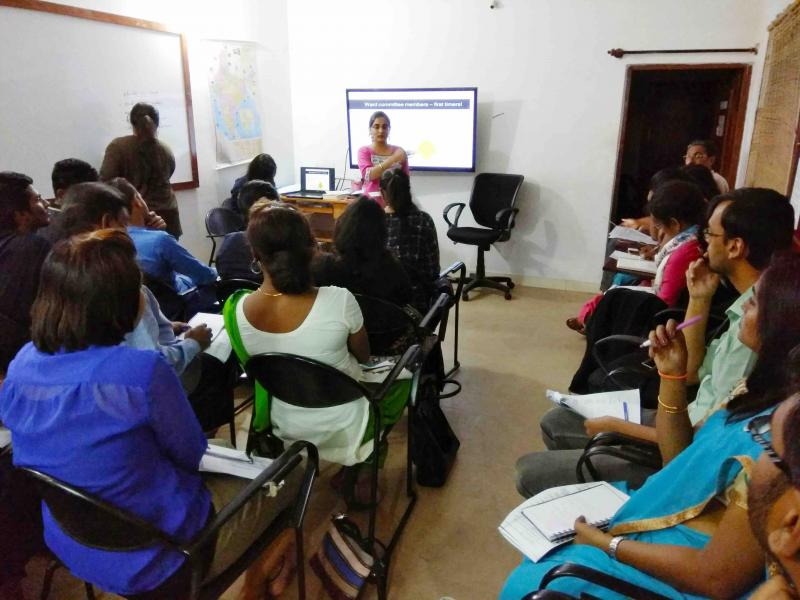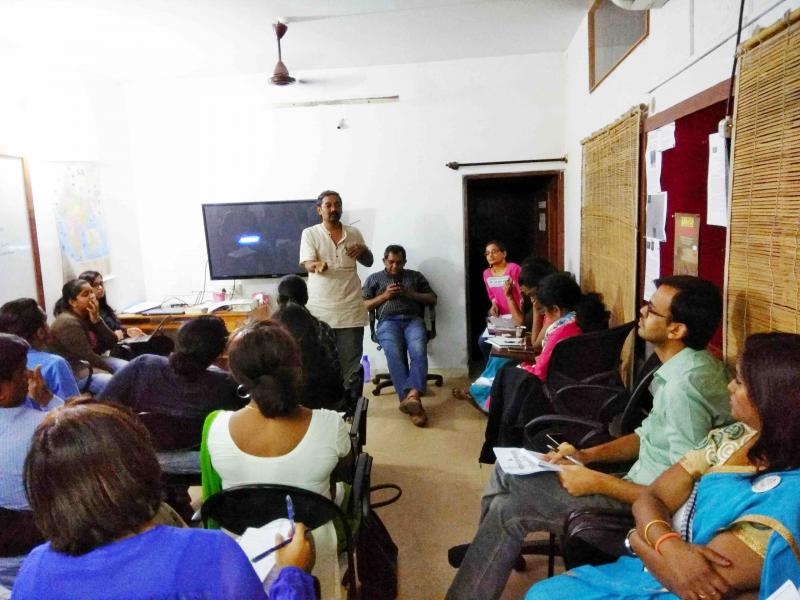Please
Recent Updates
- Public Consultation on Developing a Market Management System for... | Event Announcements | community outreach, projects | 14/11/18
- Some reasons why you shouldn't burn up your Money this Diwali | Other Documents | campaigns | 07/11/18
- Peoples Movements, Networks, Academicians, Researchers and Civil... | Press Releases | campaigns, biodiversity, tree felling, hasiru usiru | 06/11/18
- Following protest, Karnataka Forest Department Cancels Workshop to... | Press Releases | campaigns, biodiversity, tree felling, hasiru usiru | 02/11/18
- A Review of Andhra Pradesh's Climate Resilient Zero Budget... | Press Releases | community outreach, campaigns, biodiversity, publications, brinjal | 18/10/18
How to get Ward Committees to work for the city
A workshop organised as part of ESG's 'How To' Workshop series

The transformations in our cities and urban agglomeration triggered by globalization demand a review on the various developmental paradigms. Because of this, cities are becoming fragmented spaces: gated areas for wealthy citizens, ‘abandoned’ spaces for the poor. Rights deprivation like access to clean water, adequate housing, and education is becoming concentrated in these abandoned spaces. This brings in the need for taking up initiatives to create an urban space where the city offers its people an excellent quality of life.
Can the public play any role in the decision making process on matters that affect the city and its citizens at large? Well, YES. City is a process oriented space; it becomes the duty of the public to be involved in activities that will shape the city and its future.
25 Years ago, the Parliament acknowledged the failure in urban governance in the Statement of Objects and Seasons of the Constitutional 74th Amendment (Nagarpalika) Act, 1992. It was acknowledged that the failure can be attributed to weak legal basis for the functioning of urban local governments, constant interference in their functioning by State and Central governments, lack of funds and weak or no devolution of power to civic bodies. Through this amendment, Ward Committees were to be created as a third tier of governance to bring it close to the people and build systems of transparency, accountability and people’s participation in decision making.
This workshop was conducted as part of ESG's “How To Workshop” series with the objective of assisting public involvement in claiming and making Ward Committees core units of urban governance. Leo Saldanha, ESG Coordinator, explained the Constitutional mandate for setting up of the Ward Committees. He threw light on the functions of Ward Committees that have been laid out in the Karnataka Municipal Corporations Act, 1976. There always exists a resistance to share power- especially at the local levels. This power must be negotiated with and there must be a check on it always. Ward Committees in this context would help decentralize the power and also involve the general public in the decision making process.
This is reflected by who constitutes Ward Committees. 10 Members are nominated as members of whom 2 must belong to SC/ST, 3 Women Members and 2 Members representing residents associations. The Committee, chaired by the Ward Corporator, is mandated to meet once every month. The minutes of the meeting are available to the public and a copy of which must be forwarded to the Corporation for display on its website. Besides, the meetings are required to be video tapes. All this is to bring accountability and ensure that elected Councilors of the Ward take up ward works with responsibility and accountability.
The Ward Committees have the primary responsibility of preparing a Ward Development Scheme for the Ward, ensure proper utilization of funds, supervise its implementation, deal with matters related to water supply, sewerage, solid waste management, maintenance of public spaces and many other incidental tasks. While this requirement was mandated in the Constitution, it is only in November 2017 that the Ward committees became fully functional in Bangalore, and that pursuant to the order of the Karnataka High Court order in a PIL filed by Environment Support Group.
Being the beginning of a critical and fundamental process of democratisation of urban governance, how can the committees function effectively as vibrant units of Self Government? Dr. Swetha Rao Dhananka, an urban sociologist and Consultant with ESG, helped everyone think through the realistic aspects of having effectively functioning Ward Committees. She elaborated on the importance of education and capacity building in the context of individuals working for or with the Ward Committees. We need to understand the roles to be played and responsibilities to be taken. Emphasis was laid on how an individual would have an opportunity to be a part of the Ward Committee and make a contribution in taking up decision on the development of the ward. In order to make Ward committees a success story, it is upto the public to make use of the opportunity presented before them. A pace can be set, we can define roles, build viable processes and we can also learn from the successes and failures in urban governance from around the world. She quoted the success story in Recife, Brazil in having a participatory budget which created transparency in politics and ensured that the money is sent where it is needed.

Vinay Sreenivasa, lawyer and urban governance activist associated with Alternative Law Forum, asked the audience to state issues that they are currently facing and he would help them in understanding how to go about making the Ward committees accountable and work towards resolving the issues they just raised. Two issues were specifically raised: 1. repeatedly tarring roads lead to increase in its level which ultimately led to rain waters flowing into houses. 2. The Issue of Solid Waste Management in Bangalore. While addressing these issues, he spoke about the importance of using Right to Information as a tool to gain access to information and hold authorities accountable. In regard to Ward Committees, public as a matter of right can witness the meetings, otherwise RTI applications can be filed to avail the minutes of the meeting, if the minutes are not readily produced by the BBMP. This process can also be put to use to bring in a variety of welfare schemes and services to the accountability mechanisms of public review.
The participants were provided a variety of materials that would assist them to be informed about how to participate in Ward Committees.
Report prepared by Hemavathi S. Shekhar
For more information, contact hemavathi @esgindia.org
28 January 2018

